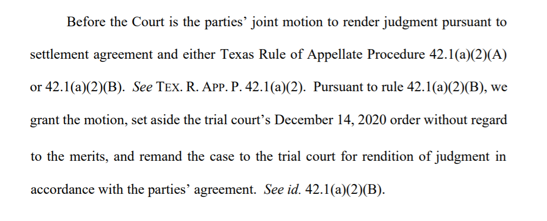In an echo of Toyota Motor Sales v. Reavis, 627 S.W.3d 713 (Tex. App.–Dallas 2021, pet. filed), the Fifth Court found that the plaintiff’s expert testimony in a significant car-accident case was sufficient to create legitimate jury issues on the topics of (1) “human factors” testimony about design defect, (2) a mechanical engineer’s testimony about a safer alternative design, and (3) proximate cause. American Honda Motor Co. v. Milburn, No. 05-19-00850-CV (Nov. 24, 2021) (mem. op.).
Monthly Archives: November 2021
“[A]ppellants assert that the order disposes of all issues based, in part, on language at the end of the order stating that ‘[a]ll other relief not expressly provided for herein is DENIED.’ The Texas Supreme Court, however, has specifically rejected such language as an indicator of an order’s finality, concluding that when, as here, no conventional trial on the merits has occurred, an order is final for purposes of appeal only if it ‘actually disposes of every pending claim and party’ or ‘clearly and unequivocally states’ it finally disposes of all parties and claims. Because the order here leaves the amount of attorney’s fees, expenses, and costs to be determined, it is not final and appealable.” Page v. 3838 Oak Lawn, No. 05-21-00859-CV (Oct. 29, 2021) (mem. op.) (applying Lehman v. Har-Con Corp., 39 S.W.3d 191 (Tex. 2001)). My LPHS colleagues Sam Hardy and Dan Polese represented the successful movant in this matter.
 The Fifth Court deftly aligned the parties’ arguments about mask requirements with the Texas Disaster Act’s statement of purpose in Abbott v. Jenkins: “Based on the evidence in the record, the trial court acted within its discretion to conclude that Jenkins demonstrated a probable right to relief on the ground that Abbott lacked authority to suspend [Tex. Gov’t Code] section 418.108 because imposing a face-covering mandate does not prevent, hinder, or delay necessary action in coping with a disaster. Arguably, the evidence shows the opposite—that by imposing a face-covering mandate, Jenkins furthered Abbott’s stated goals to preserve livelihoods and protect lives through the least restrictive means available.“ No. 05-21-00733-CV (Nov. 22, 2021) (emphasis added).
The Fifth Court deftly aligned the parties’ arguments about mask requirements with the Texas Disaster Act’s statement of purpose in Abbott v. Jenkins: “Based on the evidence in the record, the trial court acted within its discretion to conclude that Jenkins demonstrated a probable right to relief on the ground that Abbott lacked authority to suspend [Tex. Gov’t Code] section 418.108 because imposing a face-covering mandate does not prevent, hinder, or delay necessary action in coping with a disaster. Arguably, the evidence shows the opposite—that by imposing a face-covering mandate, Jenkins furthered Abbott’s stated goals to preserve livelihoods and protect lives through the least restrictive means available.“ No. 05-21-00733-CV (Nov. 22, 2021) (emphasis added).
 (This is a crosspost from 600Hemphill.) The Energizer Bunny, famously, keeps on going. Not so, the contract between Pura-Flo and Donald Clanton, under which Pura-Flo committed to pay Clanton a monthly fee for the use of fifty water coolers. The supreme court reversed and rendered as to an award of future damages in a lawsuit between them, observing:
(This is a crosspost from 600Hemphill.) The Energizer Bunny, famously, keeps on going. Not so, the contract between Pura-Flo and Donald Clanton, under which Pura-Flo committed to pay Clanton a monthly fee for the use of fifty water coolers. The supreme court reversed and rendered as to an award of future damages in a lawsuit between them, observing:
“Here, no evidence indicated the contract would endure for any length of time, let alone five years after trial. Perhaps, as the court of appeals suggested, the jury sought to award Clanton either the amount Vanderzyden originally paid Pura-Flo to buy the water coolers in 1994 or the amount Pura-Flo’s investment proposal claimed the company would pay to repurchase the water coolers after sixty months. But neither suggested rationale can be the basis for an award of future damages, which, as evidenced by its name, is an award for damages that Clanton was reasonably certain to incur in the future. Without evidence that the contract would continue in the future, the jury’s $50,000 future-damages award has no reasonable basis in evidence and therefore was not reasonably certain as required by law.”
Pura-Flo Corp. v. Clanton, No. 20-0964 (Nov. 19, 2021) (per curiam) (citations omitted, emphasis added).
Compton v. Compton, No. 05-21-00163-CV (Nov. 1, 2021), provides a good framework for approaching a settlement on appeal that includes action related to the trial-court order under appeal:
 “An unexplained delay of four months or more can constitute laches and result in denial of mandamus relief … Here, relator did not file the petition for writ of mandamus until September 22, 2021–five months after the challenged order. We conclude that relator’s unexplained delay bars their right to mandamus relief.” In re Weatherall Family Funeral Services, LLC, No. 05-21-00826-CV (Nov. 8, 2021) (mem. op.).
“An unexplained delay of four months or more can constitute laches and result in denial of mandamus relief … Here, relator did not file the petition for writ of mandamus until September 22, 2021–five months after the challenged order. We conclude that relator’s unexplained delay bars their right to mandamus relief.” In re Weatherall Family Funeral Services, LLC, No. 05-21-00826-CV (Nov. 8, 2021) (mem. op.).
The key facts of In re Woods Capital Enterprises are as follows:
- Woods Capital sued DXC Technology in Collin County for breach of a contract to sell real property, and filed a lis pendens.
- DXC moved to dismiss under the TCPA and to expunge the lis pendens.
- The trial court expunged the lis pendens, after which DXC (a) tabled its fee application related to the lis pendens, given the pending TCPA motion, (b) argued and won the TCPA motion, and (c) sought fees in connection with the TCPA motion.
- The trial court then dismissed Woods Capital’s case, awarded fees to DXC, and included a “Mother Hubbard” clause in that order.
- Woods Capital appealed and obtained reversal of the TCPA ruling in DXC’s favor. Upon remand, Woods Capital nonsuited its claims and filed a new suit in Dallas County.
- In the Collin County case, DXC filed a counterclaim for its fees associated with the lis pendens ruling.
Woods Capital filed a plea to the jurisdiction against the counterclaim, noting its nonsuit. The Collin County trial court denied the plea and the Fifth Court granted mandamus relief against that ruling, holding that the nonsuit – coupled with the Mother Hubbard clause in the earlier order – extinguished the earlier lawsuit. “Had DXC believed the trial court erred by denying its lis pendens fee application, it needed to file a cross appeal in the TCPA case.” No. 05-21-00188-CV (Nov. 8, 2021) (mem. op.).
The majority opinion in Prestonwood Tradition, LP v. Jennings, No. 05-20-00380-CV et seq. (Oct. 22, 2021).concluded that wrongful-death and survival claims were controlled by the decedents’ arbitration agreements, including their delegation of arbitrability to the arbitrator. A dissent saw matters differently, citing Roe v. Ladymon, 318 S.W.3d 502 (Tex. App.–Dallas 2010, no pet.)).
 In a temporary-injunction appeal, the Fifth Court reasoned: “During the time of COVID, remote proceedings and electronic submissions are the rule rather than the exception. Sohail’s submission of his affidavit and other evidence electronically prior to the Zoom videoconference was in compliance with the trial court’s standing order. Sohail’s evidence was put into the record, referenced and discussed without objection from appellants. Although the trial court did not use ‘magic words’ admitting into evidence Sohail’s affidavit and electronic submissions, the trial court’s order granting a temporary injunction repeatedly states that it was based on Sohail’s evidence.” Kazi v. Sohail, No. 05-20-00789-CV (Oct. 28, 2021) (mem. op.).
In a temporary-injunction appeal, the Fifth Court reasoned: “During the time of COVID, remote proceedings and electronic submissions are the rule rather than the exception. Sohail’s submission of his affidavit and other evidence electronically prior to the Zoom videoconference was in compliance with the trial court’s standing order. Sohail’s evidence was put into the record, referenced and discussed without objection from appellants. Although the trial court did not use ‘magic words’ admitting into evidence Sohail’s affidavit and electronic submissions, the trial court’s order granting a temporary injunction repeatedly states that it was based on Sohail’s evidence.” Kazi v. Sohail, No. 05-20-00789-CV (Oct. 28, 2021) (mem. op.).
After reviewing a range of cases about term limits, the Fifth Court applied them to a trust-governance issue in Employees’ Retirement Fund v. City of Dallas, holding:
“The imposition of term limits for elected Fund board members added a substantive qualification for office that rendered a class of potential candidates ineligible and effected a fundamental change to the Trust Document, which must follow the amendment process set out in the Trust Document itself. The City did not follow the amendment process set out in section 40A-35 of the City Code. Rather, in enacting section 8-1.5(a-1), the City attempted to accomplish indirectly what it was prohibited from doing directly. Accordingly, we sustain the Fund’s first and third issues.”
No. 05-20-00494-CV (Oct. 29, 2021) (emphasis added).

